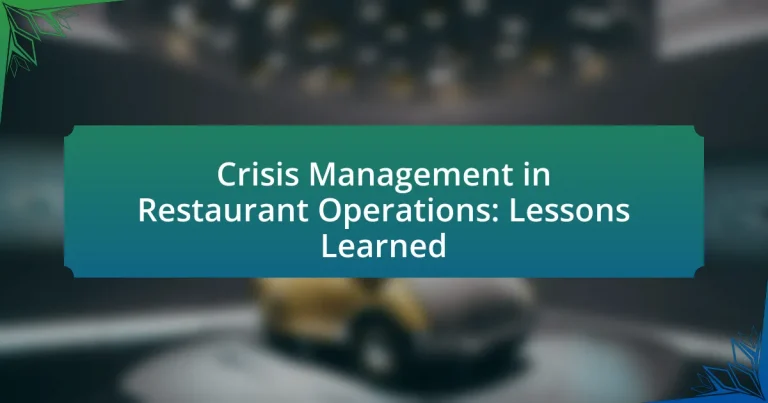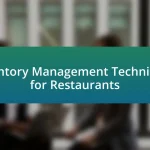Crisis management in restaurant operations encompasses the strategies and actions necessary to prepare for, respond to, and recover from unexpected disruptions, such as food safety issues, natural disasters, and public relations crises. The article outlines the significance of having a crisis management plan, effective communication, and staff training to minimize operational impact and protect a restaurant’s reputation. Key components of effective crisis management include preparation, response, and recovery, with a focus on adaptability during crises. The article also highlights common types of crises faced by restaurants, the role of communication, and best practices for developing a robust crisis management strategy to enhance resilience and recovery.
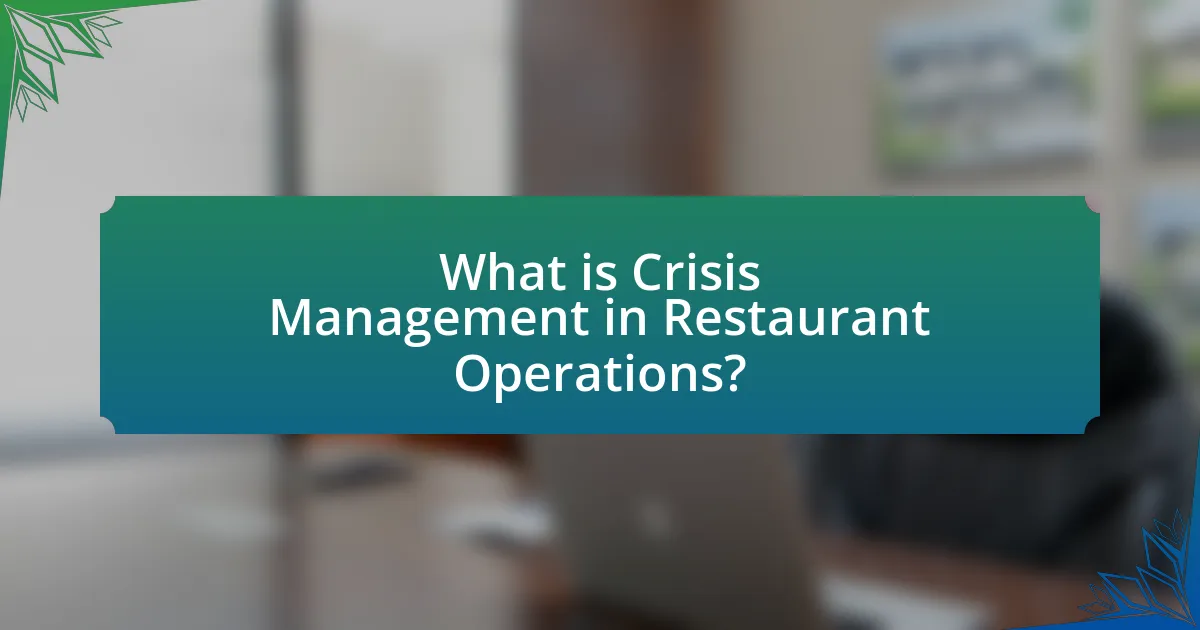
What is Crisis Management in Restaurant Operations?
Crisis management in restaurant operations refers to the strategies and actions taken to prepare for, respond to, and recover from unexpected events that disrupt normal operations. This includes handling situations such as food safety issues, natural disasters, or public relations crises. Effective crisis management involves having a clear plan, training staff, and maintaining communication with stakeholders to minimize impact and ensure a swift recovery. For instance, a study by the National Restaurant Association highlights that restaurants with established crisis management plans can reduce recovery time by up to 50%, demonstrating the importance of proactive measures in maintaining operational resilience.
How does crisis management apply specifically to restaurant operations?
Crisis management applies specifically to restaurant operations by establishing protocols to effectively respond to emergencies, ensuring business continuity and customer safety. Restaurants face various crises, such as foodborne illnesses, natural disasters, or financial downturns, which can significantly impact their operations. Implementing a crisis management plan allows restaurants to prepare for these events, minimizing disruption and protecting their reputation. For instance, the National Restaurant Association emphasizes the importance of having a crisis communication strategy to address customer concerns swiftly, which can help maintain trust and loyalty during challenging times.
What are the key components of effective crisis management in restaurants?
The key components of effective crisis management in restaurants include preparation, communication, response, and recovery. Preparation involves developing a crisis management plan that outlines potential risks and response strategies, ensuring staff are trained and aware of their roles during a crisis. Communication is crucial; it requires clear, timely information dissemination to staff, customers, and stakeholders to maintain trust and transparency. The response component focuses on executing the crisis management plan efficiently, addressing the immediate issues while prioritizing safety and service continuity. Finally, recovery entails assessing the crisis’s impact, implementing improvements based on lessons learned, and restoring normal operations. Research indicates that restaurants with a well-defined crisis management strategy are more resilient and can recover faster from adverse events, highlighting the importance of these components.
How do restaurant operations differ in crisis situations compared to normal operations?
Restaurant operations in crisis situations differ significantly from normal operations primarily in their focus on adaptability and resource management. During a crisis, restaurants often implement emergency protocols, such as reduced menus, limited staff, and enhanced safety measures, to ensure operational continuity and customer safety. For instance, during the COVID-19 pandemic, many restaurants shifted to takeout and delivery models, which required rapid adjustments in logistics and customer service strategies. This adaptability is crucial as it allows restaurants to respond to immediate challenges while maintaining service levels. Additionally, crisis situations often necessitate increased communication with staff and customers to manage expectations and provide updates, contrasting with the more routine communication in normal operations.
Why is crisis management essential for restaurants?
Crisis management is essential for restaurants because it enables them to effectively respond to unexpected challenges, minimizing operational disruptions and protecting their reputation. Restaurants face various crises, such as food safety issues, natural disasters, or public relations incidents, which can significantly impact customer trust and financial stability. For instance, a study by the National Restaurant Association found that 70% of restaurants that experienced a crisis without a management plan faced severe financial losses or closure. By implementing a robust crisis management strategy, restaurants can ensure swift communication, maintain customer loyalty, and recover more quickly from adverse events.
What potential risks do restaurants face that necessitate crisis management?
Restaurants face several potential risks that necessitate crisis management, including food safety issues, financial instability, and reputational damage. Food safety incidents, such as contamination or outbreaks of foodborne illnesses, can lead to severe health consequences for customers and legal repercussions for the establishment. Financial instability can arise from unexpected events like natural disasters, economic downturns, or supply chain disruptions, which can threaten the restaurant’s viability. Additionally, reputational damage from negative reviews or social media backlash can significantly impact customer trust and loyalty. According to the National Restaurant Association, 75% of restaurant operators reported that they had to manage a crisis in the past year, highlighting the prevalence and importance of effective crisis management strategies in the industry.
How can effective crisis management protect a restaurant’s reputation?
Effective crisis management can protect a restaurant’s reputation by enabling swift and transparent communication during adverse events. When a crisis occurs, such as food safety issues or negative publicity, a well-structured crisis management plan allows the restaurant to address the situation promptly, minimizing customer concerns and maintaining trust. For instance, a study by the Harvard Business Review found that companies with effective crisis management strategies can recover their reputations faster and often emerge stronger than before the crisis. This demonstrates that proactive measures, including timely updates and customer engagement, are crucial in safeguarding a restaurant’s image during challenging times.
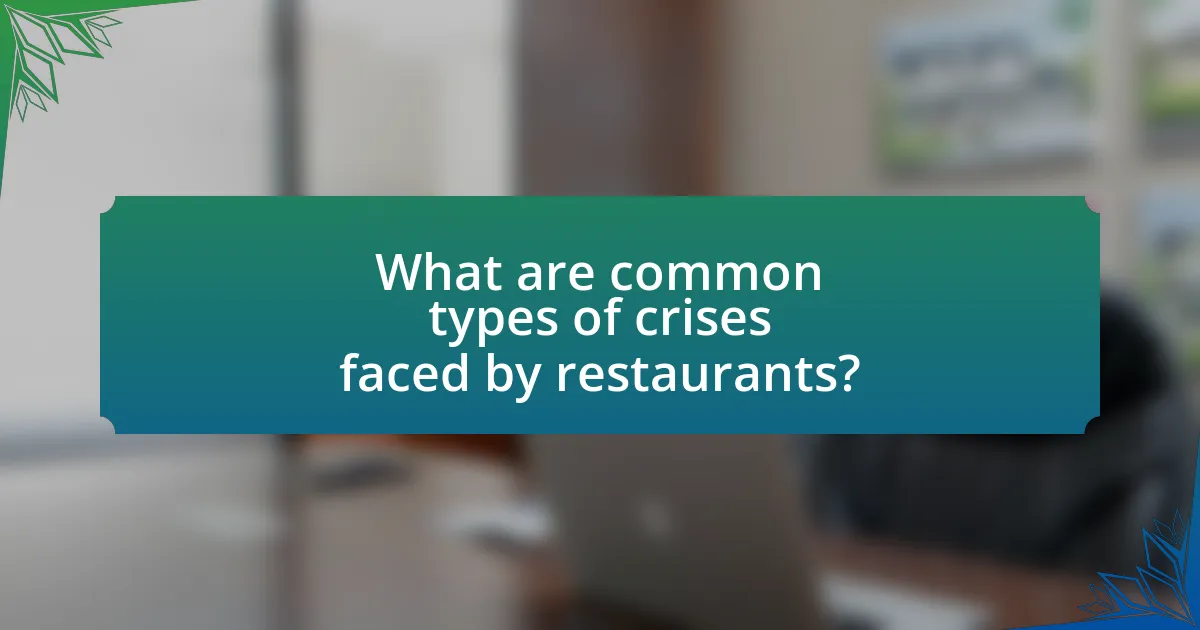
What are common types of crises faced by restaurants?
Restaurants commonly face crises such as food safety issues, financial difficulties, staffing shortages, and negative publicity. Food safety issues can arise from contamination or improper handling, leading to health risks and potential lawsuits. Financial difficulties often stem from fluctuating sales, increased operational costs, or economic downturns, which can threaten a restaurant’s viability. Staffing shortages, exacerbated by high turnover rates in the industry, can disrupt service quality and operational efficiency. Negative publicity, whether from social media backlash or poor reviews, can significantly impact a restaurant’s reputation and customer base. Each of these crises requires effective management strategies to mitigate their impact and ensure business continuity.
How do health and safety crises impact restaurant operations?
Health and safety crises significantly disrupt restaurant operations by leading to immediate closures, reduced customer trust, and increased regulatory scrutiny. For instance, during the COVID-19 pandemic, many restaurants faced temporary shutdowns mandated by health authorities, resulting in a loss of revenue and the need to adapt to new health guidelines. Additionally, restaurants often experience a decline in customer patronage due to fears of contamination, which can lead to long-term financial instability. Furthermore, health and safety crises can trigger stricter inspections and compliance requirements, increasing operational costs and necessitating staff training on new protocols. These factors collectively illustrate how health and safety crises can severely impact the viability and operational efficiency of restaurants.
What are the most common health-related crises in restaurants?
The most common health-related crises in restaurants include foodborne illnesses, allergen exposure, and sanitation violations. Foodborne illnesses, often caused by improper food handling or storage, can lead to widespread outbreaks, affecting multiple customers and resulting in significant financial losses and reputational damage. According to the Centers for Disease Control and Prevention, approximately 48 million people in the U.S. get sick from foodborne diseases each year. Allergen exposure occurs when customers unknowingly consume food containing allergens, which can lead to severe reactions and even fatalities. The FDA reports that food allergies affect about 32 million Americans, highlighting the critical need for proper labeling and staff training. Sanitation violations, such as inadequate cleaning practices or pest infestations, can also pose serious health risks and lead to health department fines or closures. These crises underscore the importance of rigorous health and safety protocols in restaurant operations.
How can restaurants prepare for food safety emergencies?
Restaurants can prepare for food safety emergencies by implementing a comprehensive food safety management system that includes regular training, proper food handling procedures, and emergency response plans. Regular training ensures that staff are knowledgeable about food safety protocols, which is critical as the CDC reports that foodborne illnesses affect 48 million people annually in the U.S. Establishing clear food handling procedures, such as maintaining proper temperatures and preventing cross-contamination, helps mitigate risks. Additionally, having an emergency response plan that outlines steps to take during a food safety incident, including communication strategies and reporting protocols, is essential for effective crisis management. This proactive approach not only safeguards public health but also protects the restaurant’s reputation and financial stability.
What role does communication play in crisis management?
Communication is essential in crisis management as it facilitates timely information dissemination, coordination, and decision-making. Effective communication ensures that all stakeholders, including employees, customers, and suppliers, are informed about the crisis, the actions being taken, and any necessary safety measures. For instance, during the COVID-19 pandemic, restaurants that communicated clearly about health protocols and operational changes were able to maintain customer trust and loyalty, as evidenced by a survey from the National Restaurant Association, which found that 80% of consumers appreciated clear communication from restaurants during the crisis. This highlights that strong communication strategies can mitigate the negative impacts of a crisis and enhance overall operational resilience.
How should restaurants communicate with staff during a crisis?
Restaurants should communicate with staff during a crisis through clear, consistent, and timely messaging. Effective communication involves utilizing multiple channels such as meetings, emails, and messaging apps to ensure all staff members receive the same information simultaneously. For instance, during the COVID-19 pandemic, many restaurants adopted daily briefings to update staff on health protocols and operational changes, which helped maintain transparency and trust. Research indicates that organizations with strong internal communication during crises experience 50% less employee turnover, highlighting the importance of effective communication strategies in maintaining staff morale and operational efficiency.
What strategies can be used to communicate with customers effectively?
Effective communication strategies with customers include active listening, clear messaging, and timely updates. Active listening ensures that customer concerns are fully understood, which fosters trust and rapport. Clear messaging involves using straightforward language to convey information, avoiding jargon that may confuse customers. Timely updates, especially during crises, keep customers informed about changes, such as menu adjustments or safety protocols, which is crucial for maintaining customer confidence. Research indicates that businesses that prioritize effective communication during crises can enhance customer loyalty and satisfaction, as evidenced by a study published in the Journal of Business Research, which found that transparent communication significantly improves customer perceptions during challenging times.
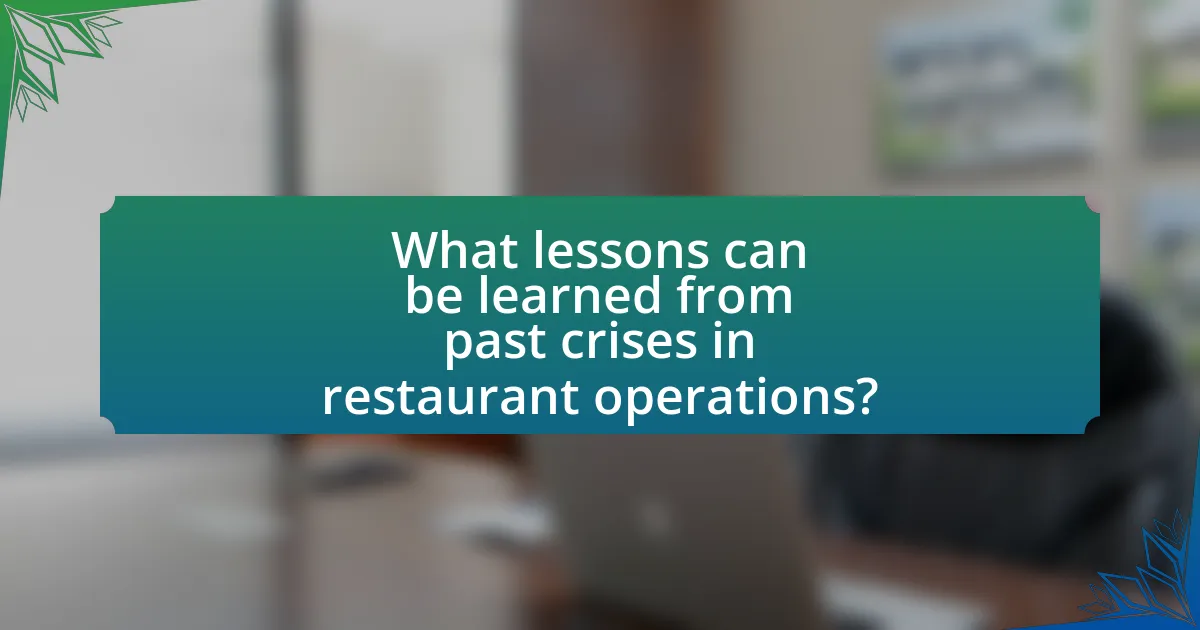
What lessons can be learned from past crises in restaurant operations?
Past crises in restaurant operations highlight the importance of adaptability, financial resilience, and effective communication. For instance, during the COVID-19 pandemic, many restaurants that quickly pivoted to takeout and delivery services were able to sustain operations, demonstrating the need for flexibility in service models. Financially, restaurants that maintained a cash reserve or diversified revenue streams were better equipped to weather downturns, as evidenced by a National Restaurant Association report indicating that 30% of restaurants closed temporarily during the pandemic, while those with robust financial planning survived. Additionally, clear communication with staff and customers proved vital; restaurants that kept their teams informed and engaged were more likely to retain employees and customer loyalty, as shown in surveys where businesses with strong internal communication reported higher satisfaction rates among both employees and patrons.
What are some notable case studies of crisis management in restaurants?
Notable case studies of crisis management in restaurants include the response of Chipotle to its E. coli outbreak in 2015 and the handling of the COVID-19 pandemic by various establishments. Chipotle implemented extensive food safety protocols, including sourcing changes and employee training, which led to a recovery in customer trust and sales, demonstrating effective crisis management. During the COVID-19 pandemic, many restaurants, such as Olive Garden, adapted by enhancing takeout and delivery services, implementing safety measures, and leveraging digital platforms, which allowed them to maintain operations and customer engagement despite significant challenges. These examples illustrate how proactive measures and adaptability are crucial in crisis management within the restaurant industry.
What were the key takeaways from successful crisis responses?
Key takeaways from successful crisis responses in restaurant operations include the importance of clear communication, adaptability, and proactive planning. Clear communication ensures that all stakeholders, including staff and customers, are informed and aligned during a crisis, which can significantly reduce confusion and enhance trust. Adaptability allows restaurants to pivot their strategies quickly in response to changing circumstances, such as shifting to takeout or delivery models during a pandemic. Proactive planning involves having contingency plans in place, which can include training staff for emergency situations and establishing protocols for health and safety. These elements have been validated by case studies from various restaurants that successfully navigated crises, demonstrating that effective crisis management leads to resilience and recovery.
How did unsuccessful crisis management impact certain restaurants?
Unsuccessful crisis management led to significant financial losses and reputational damage for certain restaurants. For instance, during the COVID-19 pandemic, many establishments failed to adapt their operations, resulting in a 70% decline in revenue for some, as reported by the National Restaurant Association. Additionally, restaurants that did not effectively communicate safety measures faced customer distrust, leading to decreased patronage and long-term brand harm.
What best practices can restaurants adopt for future crisis management?
Restaurants can adopt several best practices for future crisis management, including developing a comprehensive crisis management plan, training staff regularly, and maintaining clear communication channels. A comprehensive crisis management plan outlines procedures for various potential crises, ensuring that all employees understand their roles and responsibilities. Regular staff training prepares employees to respond effectively during emergencies, which is crucial for minimizing chaos and ensuring safety. Clear communication channels, both internally among staff and externally with customers, help manage expectations and provide timely updates, which is essential during a crisis. According to a study by the National Restaurant Association, restaurants that implemented structured crisis management strategies reported a 30% faster recovery time after crises compared to those without such plans.
How can restaurants develop a crisis management plan?
Restaurants can develop a crisis management plan by identifying potential risks, establishing clear protocols, and training staff on emergency procedures. First, restaurants should conduct a risk assessment to identify vulnerabilities such as food safety issues, natural disasters, or public relations crises. Next, they must create a detailed response plan that outlines specific actions to take during various crisis scenarios, ensuring that roles and responsibilities are clearly defined. Training staff through regular drills and simulations reinforces preparedness and ensures everyone knows their role in a crisis. According to the National Restaurant Association, 60% of restaurants that have a crisis management plan in place report feeling more confident in their ability to handle emergencies effectively.
What training should staff receive to handle crises effectively?
Staff should receive training in crisis communication, emergency response procedures, and conflict resolution to handle crises effectively. Crisis communication training equips staff with the skills to convey clear and accurate information to customers and team members during emergencies, which is crucial for maintaining trust and order. Emergency response procedures training ensures that staff are familiar with protocols for various scenarios, such as fire, medical emergencies, or natural disasters, enabling them to act swiftly and appropriately. Conflict resolution training prepares staff to manage disputes and stressful situations calmly, reducing escalation and fostering a positive environment. Research indicates that organizations with comprehensive crisis management training experience 30% faster recovery times and improved customer satisfaction during crises.
What practical tips can restaurants implement for effective crisis management?
Restaurants can implement several practical tips for effective crisis management, including developing a comprehensive crisis management plan, training staff on emergency protocols, and maintaining clear communication with customers and stakeholders. A comprehensive crisis management plan outlines specific procedures for various scenarios, ensuring that all team members know their roles during a crisis. Training staff on emergency protocols, such as food safety issues or natural disasters, prepares them to respond swiftly and effectively. Clear communication with customers and stakeholders, especially during a crisis, helps maintain trust and transparency, which is crucial for customer retention. According to a study by the National Restaurant Association, 70% of consumers prefer businesses that communicate openly during crises, highlighting the importance of effective communication strategies.
